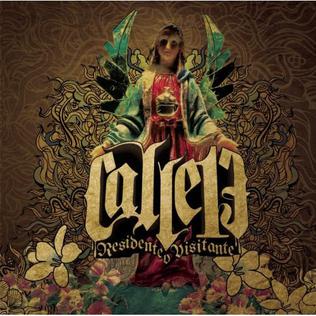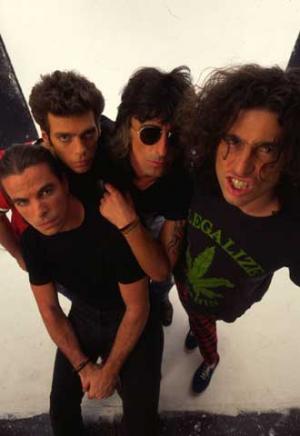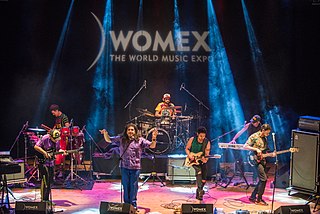
The music of Argentina includes a variety of traditional, classical, and popular genres. According to the Harvard Dictionary of Music, Argentina also "has one of the richest art music traditions and perhaps the most active contemporary musical life.

The music of Colombia is an expression of Colombian culture, music genres, both traditional and modern, according with the features of each geographic region, although it is not uncommon to find different musical styles in the same region. The diversity in musical expressions found in Colombia can be seen as the result of a mixture of Amerindian, African, and European influences, as well as more modern American.

Natalia Marisa Oreiro Iglesias is a Uruguayan actress, singer, songwriter, model, television presenter and fashion designer. She began her career in telenovelas but since 2008 she has switched to work primarily in films. Oreiro has worked on social awareness shows and events for organizations like Greenpeace and UNICEF, the latter of which designated her as ambassador for Argentina and Uruguay in September 2011.
Cumbia villera is a subgenre of cumbia music originating in Argentina in the late 1990s and popularized all over Latin America and Latin communities abroad.

Andrés Calamaro is an Argentine musician, composer and Latin Grammy winner. He is considered one of the greatest and most influential rock artists in Spanish. He is also one of the most complete artists for his wide range of musical styles, including funk, reggae, ballads, boleros, tangos, jazz. His former band Los Rodríguez was a major success in Spain and throughout Latin America mainly during the 1990s. He is multi-instrumentalist and became one of the main icons of Argentine rock, selling over 1.3 million records to date.

Raúl Alberto Antonio Gieco, better known as León Gieco is an Argentine folk rock performer, composer and interpreter. He is known for mixing popular folkloric genres with Argentine rock, and lyrics with social and political connotations. This has led to him being called "The Argentine Bob Dylan".

"Rebelde" is the debut single by Mexican pop group RBD. It was released on 30 September 2004, as the lead single from their debut album Rebelde in 2004. "Rebelde" became 2005's major hit in Mexico and was the song that started the band's successful career. The single is widely considered to be the group's signature song since RBD is short for Rebelde, and was performed in all of the group's tours. The song was used extensively in the soap opera Rebelde during its first season. A Portuguese version with the same name was released as the first single of the album's Brazilian edition on 1 November 2005.

José Martín Cuevas Cobos, known by his stage name Pedro Fernández, is a Mexican singer, songwriter, actor, and television host. Fernández began his international career as Pedrito Fernández at the age of seven.

María de Lourdes Rojo e Incháustegui, commonly known as María Rojo, is a Mexican actress and politician. She was Senator of the Republic in the upper house of Mexican Congress. She debuted during the Golden Age of Mexican cinema.

InsoportablemENte VIVO is the seventh album and the second live album by Argentine hard rock band La Renga. It was recorded at the Huracán Athletic Club Stadium on May 19, 2001. It has two unedited songs: Un Tiempo Fuera De Casa and Oportunidad Oportuna. It achieved 2× platinum status in Argentina for sales in excess of 80,000 copies.

Damas Gratis is an Argentine cumbia villera band started by Pablo Lescano in 2000.

Residente o Visitante is the second studio album by Puerto Rican urban/hip hop band Calle 13, released on April 24, 2007, by Sony BMG. Recorded in various countries while on tour in promotion of the duo's debut album Calle 13, Residente o Visitante marked an evolution in the band's musical and lyrical style. While writing the album, the duo took a trip to South America to explore areas populated by Latin America's indigenous and African-descended minorities, a journey that greatly influenced the music on Residente o Visitante. The album features six guest artists and delves into genres such as tango, bossa nova, cumbia, and electronica.

Los Rodríguez were a rock band composed of two Argentines, two Spaniards and one Puerto Rican that played during the 1990s.

Grupera is a subgenre of regional Mexican music. It reached the height of its popularity in the 1990s, especially in rural areas. The music has roots in the rock groups of the 1960s, but today generally consists of four or more musicians using electric guitars, keyboards and drums. The music increased in popularity in the 1980s and became commercially viable, and is now recognized in some Latin music awards ceremonies such as Lo Nuestro and The Latin Grammy Awards. Grupero artists typically perform rancheras, corridos, cumbias, charangas, ballads, boleros and huapangos.

"Baila Esta Cumbia" is a song recorded by American Tejano singer Selena for her second studio album, Ven Conmigo (1990). It was released as the second single by EMI Latin on August 28, 1990, behind "Ya Ves". It was composed by her brother–producer A.B. Quintanilla, and Selena y Los Dinos backup dancer, Pete Astudillo. The recording is an up-tempo Mexican cumbia song. It was well received by music critics who enjoyed its cumbia-feel and rhythm.

Maricarmen Marín Salinas is a Peruvian actress, cumbia singer, dancer, and TV host. She started as a dancer in the musical show "La movida de los Sabados" and she became famous as the lead singer of the female technocumbia musical group "Agua Bella". Maricarmen participated in El Gran Show in 2010. In 2011 she currently stars as Natasha in the América Televisión series "Yo no me llamo Natacha" for which she also performed the theme song. She is also currently a solo singer. In 2018, she released her new hit song ¿Por Qué Te Fuiste? which had airplay success throughout Latin America and Europe.

Bareto is a music group from Peru, famous for making their own versions of classic Peruvian cumbia songs.

José Ariel Camacho Barraza was a Mexican musician and singer-songwriter. He predominantly performed regional Mexican music, mainly corridos. He was the lead singer and lead guitarist of his group, Ariel Camacho y Los Plebes del Rancho. In 2013 Ariel Camacho y Los Plebes del Rancho signed to JG Records where they frequently played in Tijuana, Baja California, Mexico. In 2014 they signed with DEL Records, which allowed them to play their music in the United States.

Pablo Sebastián Lescano is an Argentine singer, composer, keyboardist, and leader of Cumbia villera group Damas Gratis from 2000. He is considered by many as the founder of the Cumbia villera sub-genre.
Sólo le pido a Dios is a famous protest song, written by Argentine singer-songwriter León Gieco. It is the first song of Gieco's 1978 album, IV LP.

















